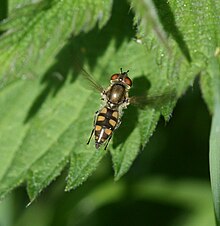| Platycheirus manicatus | |
|---|---|

| |
| male | |

| |
| female | |
| Scientific classification | |
| Kingdom: | |
| Phylum: | |
| Class: | |
| Order: | |
| Family: | |
| Subfamily: | |
| Tribe: | |
| Genus: | |
| Subgenus: | |
| Species: | P. manicatus
|
| Binomial name | |
| Platycheirus manicatus (
Meigen, 1822)
| |
| Synonyms | |

Platycheirus manicatus is a species of hoverfly. It is found across the Palearctic and in Alaska. [1] [2] [3] [4] [5]
Description
External images
For terms, see:
Morphology of Diptera.
Mouth edge is projecting beyond facial knob, and abdomen has four pairs of large yellow marks. Thorax dorsum is dull; tibiae and tarsi of leg 1 are diagnostic.
Distribution
Palearctic: Fennoscandia south to Iberia, the Mediterranean basin, Ireland eastwards through Europe into Turkey and Russia then Siberia and the Altai. Nearctic: Alaska and Greenland. [6] [7] [8]
Biology
Habitat: fen, humid, grassland (to above 2,000 metres or 6,600 feet in the Alps), moorland and taiga. It flies May to September. [3]
References
- ^ Ball, Stuart; Morris, Roger (2013). Britain's Hoverflies: An Introduction to the Hoverflies of Britain. Woodstock, Oxfordshire: Princeton University Press. pp. 296pp. ISBN 978-0-691-15659-0.
- ^ Ball, S.G.; Morris, R.K.A. (2000). Provisional atlas of British hoverflies (Diptera, Syrphidae). Monks Wood, UK: Biological Record Centre. pp. 167 pages. ISBN 1-870393-54-6.
- ^ a b Speight, M.C.D. (2011). "Species accounts of European Syrphidae (Diptera)" (PDF). Syrph the Net, the database of European Syrphidae. 65: 285pp.
- ^ Stubbs, Alan E.; Falk, Steven J (1983). British Hoverflies: An Illustrated Identification Guide (2nd ed.). London: British Entomological and Natural History Society. pp. 253, xvpp. ISBN 1-899935-03-7.
- ^ Van Veen, M.P. (2004). Hoverflies of Northwest Europe, Identification Keys to the Syrphidae (Hardback). Utrecht: KNNV Publishing. p. 254. ISBN 90-5011-199-8.
- ^ Fauna Europaea.
- ^ Peck, L.V. (1988). "Syrphidae". In: Soos, A. & Papp, L. (eds.). Catalogue of Palaearctic Diptera 8: 11-230. Akad. Kiado, Budapest.
- ^ Vockeroth, J.R. (1992). The Flower Flies of the Subfamily Syrphinae of Canada, Alaska, and Greenland (Diptera: Syrphidae). Part 18. The Insects and Arachnids of Canada. Ottawa, Ontario: Canadian Government Pub Centre. pp. 1–456. ISBN 0-660-13830-1.
| Platycheirus manicatus | |
|---|---|

| |
| male | |

| |
| female | |
| Scientific classification | |
| Kingdom: | |
| Phylum: | |
| Class: | |
| Order: | |
| Family: | |
| Subfamily: | |
| Tribe: | |
| Genus: | |
| Subgenus: | |
| Species: | P. manicatus
|
| Binomial name | |
| Platycheirus manicatus (
Meigen, 1822)
| |
| Synonyms | |

Platycheirus manicatus is a species of hoverfly. It is found across the Palearctic and in Alaska. [1] [2] [3] [4] [5]
Description
External images
For terms, see:
Morphology of Diptera.
Mouth edge is projecting beyond facial knob, and abdomen has four pairs of large yellow marks. Thorax dorsum is dull; tibiae and tarsi of leg 1 are diagnostic.
Distribution
Palearctic: Fennoscandia south to Iberia, the Mediterranean basin, Ireland eastwards through Europe into Turkey and Russia then Siberia and the Altai. Nearctic: Alaska and Greenland. [6] [7] [8]
Biology
Habitat: fen, humid, grassland (to above 2,000 metres or 6,600 feet in the Alps), moorland and taiga. It flies May to September. [3]
References
- ^ Ball, Stuart; Morris, Roger (2013). Britain's Hoverflies: An Introduction to the Hoverflies of Britain. Woodstock, Oxfordshire: Princeton University Press. pp. 296pp. ISBN 978-0-691-15659-0.
- ^ Ball, S.G.; Morris, R.K.A. (2000). Provisional atlas of British hoverflies (Diptera, Syrphidae). Monks Wood, UK: Biological Record Centre. pp. 167 pages. ISBN 1-870393-54-6.
- ^ a b Speight, M.C.D. (2011). "Species accounts of European Syrphidae (Diptera)" (PDF). Syrph the Net, the database of European Syrphidae. 65: 285pp.
- ^ Stubbs, Alan E.; Falk, Steven J (1983). British Hoverflies: An Illustrated Identification Guide (2nd ed.). London: British Entomological and Natural History Society. pp. 253, xvpp. ISBN 1-899935-03-7.
- ^ Van Veen, M.P. (2004). Hoverflies of Northwest Europe, Identification Keys to the Syrphidae (Hardback). Utrecht: KNNV Publishing. p. 254. ISBN 90-5011-199-8.
- ^ Fauna Europaea.
- ^ Peck, L.V. (1988). "Syrphidae". In: Soos, A. & Papp, L. (eds.). Catalogue of Palaearctic Diptera 8: 11-230. Akad. Kiado, Budapest.
- ^ Vockeroth, J.R. (1992). The Flower Flies of the Subfamily Syrphinae of Canada, Alaska, and Greenland (Diptera: Syrphidae). Part 18. The Insects and Arachnids of Canada. Ottawa, Ontario: Canadian Government Pub Centre. pp. 1–456. ISBN 0-660-13830-1.